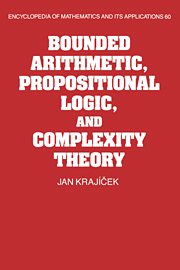Book contents
- Frontmatter
- Contents
- Preface
- Acknowledgments
- 1 Introduction
- 2 Preliminaries
- 3 Basic complexity theory
- 4 Basic propositional logic
- 5 Basic bounded arithmetic
- 6 Definability of computations
- 7 Witnessing theorems
- 8 Definability and witnessing in second order theories
- 9 Translations of arithmetic formulas
- 10 Finite axiomatizability problem
- 11 Direct independence proofs
- 12 Bounds for constant-depth Frege systems
- 13 Bounds for Frege and extended Frege systems
- 14 Hard tautologies and optimal proof systems
- 15 Strength of bounded arithmetic
- References
- Subject index
- Name index
- Symbol index
4 - Basic propositional logic
Published online by Cambridge University Press: 02 December 2009
- Frontmatter
- Contents
- Preface
- Acknowledgments
- 1 Introduction
- 2 Preliminaries
- 3 Basic complexity theory
- 4 Basic propositional logic
- 5 Basic bounded arithmetic
- 6 Definability of computations
- 7 Witnessing theorems
- 8 Definability and witnessing in second order theories
- 9 Translations of arithmetic formulas
- 10 Finite axiomatizability problem
- 11 Direct independence proofs
- 12 Bounds for constant-depth Frege systems
- 13 Bounds for Frege and extended Frege systems
- 14 Hard tautologies and optimal proof systems
- 15 Strength of bounded arithmetic
- References
- Subject index
- Name index
- Symbol index
Summary
This chapter will present basic propositional calculus. By that I mean properties of propositional calculus established by direct combinatorial arguments as distinguished from high level arguments involving concepts (or motivations) from other parts of logic (bounded arithmetic) and complexity theory.
Examples of the former are various simulation results or the lower bound for resolution from Haken (1985). Examples of the latter are the simulation of the Frege system with substitution by the extended Frege system (Lemma 4.5.5 and Corollary 9.3.19), or the construction of the provably hardest tautologies from the fmitistic consistency statements (Section 14.2).
We shall define basic propositional proof systems: resolution R, extended resolution ER, Frege system F, extended Frege system EF, Frege system with the substitution rule SF, quantified propositional calculus G, and Gentzen's sequent calculus LK. We begin with the general concept of a propositional proof system.
Propositional proof systems
A property of the usual textbook calculus is that it can be checked in deterministic polynomial time whether a string of symbols is a proof in the system or not. This is generalized into the following basic definition of Cook and Reckhow (1979).
Definition 4.1.1. Let TA UT be the set of propositional tautologies in the language with propositional connectives: constants 0 (FALSE) and 1 (TRUE), ¬ (negation), ∨ (disjunction), and & (conjunction), and atoms p1, p2,…
A propositional proof system is a polynomial time function P whose range is the set TAUT.
- Type
- Chapter
- Information
- Publisher: Cambridge University PressPrint publication year: 1995



